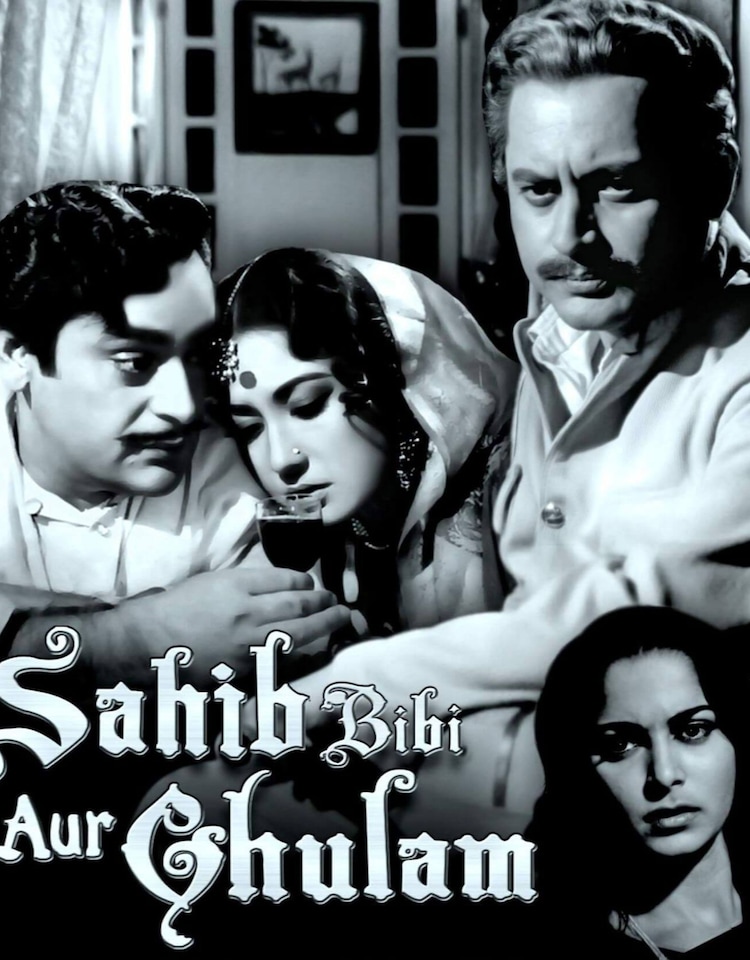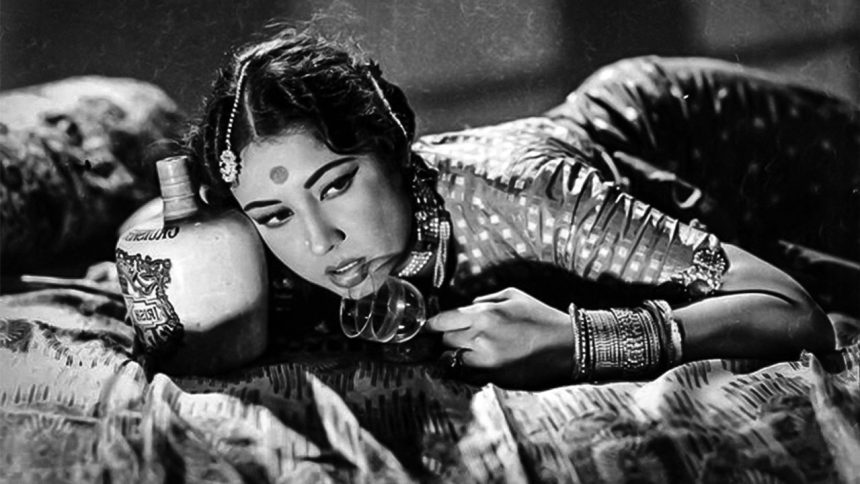Sahib Bibi Aur Ghulam: A Tragedy That Foretold Meena Kumari’s Doom
In our Retro Review series, we revisit Meena Kumari’s haunting role in ‘Sahib Bibi Aur Ghulam’, where her performance mirrored her unraveling life, weaving a tragic prophecy of love, loss, and addiction.
- Retro Review: Sahib Bibi Aur Ghulam (1962)
- Starring: Meena Kumari, Guru Dutt, Waheeda Rehman, Rehman
- Producer: Guru Dutt
- Director: Abrar Alvi
- Music: Hemant Kumar
- Where To Watch: YouTube
- Why To Watch: For Meena Kumari’s iconic portrayal of a woman yearning for her husband’s love Moral of the Story: Art often mirrors life, turning into a tragic prophecy of love, loss, and despair.
Legendary actor Mahjabeen Alibux was known by two other names until her death, one of which became her destiny.
Mahjabeen first faced the camera at the tender age of four, carrying forward the legacy of her mother, herself an actor. Her fourth film, ‘Ek Hi Bhool’, earned her the screen name Baby Meena, bestowed upon her by the film’s director, Vijay Bhatt.
By the late 1940s, Meena had blossomed into a petite beauty, with a slightly rounded face and sparkling eyes. Captivated by her charm and innocence, directors eagerly cast her in romantic musicals and comedies.

In ‘Baiju Bawra’, a film famously declined by Dilip Kumar to his lasting regret, Meena captivated India’s heart as a village belle singing Naushad’s melodies. Around the same time, she starred in ‘Miss Mary’, a spirited comedy that showcased her effortless flair for humour.
Who could have imagined that this star of romantic comedies and musicals would transform into a tragedy queen, a title that would come to mirror her own tumultuous life?
Certain films serve as haunting prophecies of the lives of their actors and directors, acting as chronicles of tragedies foretold. No film captures Meena Kumari’s transformation from romantic heroine to tragic figure, and her subsequent descent into alcoholism, more poignantly than ‘Sahib Bibi Aur Ghulam’ (1962).
A Tragedy Foretold
The film Sahib Bibi Aur Ghulam is a paradox, a haunting reminder of humanity’s struggle against inescapable destiny. By the late 1950s, Guru Dutt had lost confidence in his directorial vision, shaken by the commercial failure of Kaagaz Ke Phool. Beyond directing, he yearned to shed his onscreen persona as a tragic hero, an image forged through his soulful performances in Pyaasa and Kaagaz Ke Phool. Yet, his fascination with tragedy endured, drawing him to produce and star in Sahib Bibi Aur Ghulam, a poignant tale of decadent morality among Calcutta’s zamindars and the devastating toll it exacts on its protagonist, Chhoti Bahu, portrayed by Meena Kumari.
In a striking reversal of roles, Guru Dutt—the eternal tragedian—cast himself as a village bumpkin, infusing his character with shades of comedy and guileless charm. The weight of inescapable tragedy fell instead on Meena Kumari, once the effervescent star of romantic musicals and comedies. Her portrayal of Chhoti Bahu, a woman consumed by unfulfilled longing and spiraling into alcoholism, marked a seismic shift, transforming her into the tragedy queen and eerily foreshadowing her own descent into personal turmoil.
Some curses, perhaps, are inescapable.
A Stirring Tragedy
‘Sahib Bibi Aur Ghulam’ is so layered that it invites multiple viewings, each revealing new depths. Yet, the frames that linger most are those where Meena Kumari pours out her anguish, first as a woman yearning for her husband’s love, then as an alcoholic teetering on self-destruction.
Her stirring voice, hollow laughter, and mournful eyes transform Chhoti Bahu into a haunting emblem of despair, a figure whose pain echoes Meena Kumari’s own unraveling life, forever etching her tragedy queen persona into the annals of cinema.
Meena Kumari plays the doomed addict with haunting perfection. Her droopy eyes, slurred speech and unsteady gaze transform her persona, making her transition effortlessly between affection, rage, lust and melancholia. The camera captures her downfall with haunting closeups, creating a tableau of heartbreak so potent it encapsulates the film’s tragic core, leaving an indelible mark on the viewer’s soul.
An iconic scene, where Chhoti Bahu’s futile yearning collides with her husband’s indifference, is a searing exploration of unattainable love. A drunk Chhoti Bahu implores her philandering husband, played by Rehman’s with chilling detachment, to stay with her. ‘Na Jao Saiyyan’, she sings seductively, her eyes burning with pain and longing, her tresses falling on her playful face. When he refuses to stay with her, Meena Kumari breaks into hysterical laughter and heart-rending sobs. Rehman’s restrained yet menacing presence amplifies Meena Kumari’s vulnerability, making their interplay a goosebump-inducing pinnacle of art.
The scene’s stark cinematography and Hemant Kumar’s melancholic score heighten its emotional weight, making it a touchstone for Indian cinema. Just for these fifteen minutes of wizardry, Meena Kumari deserves to be forever in the pantheon of greats.
From Real To Reel
For Meena Kumari, this moment was more than performance, it was a haunting echo of her fractured relationships, a mirror held up to her life’s unraveling.
Her marriage to Kamal Amrohi, director of the cult classic ‘Pakeezah’, had failed. Once a union of creative minds, it soured as his possessiveness and strict rules, such as barring her from signing new films or staying out late, stifled her spirit. Reports of physical altercations, including an incident where Amrohi’s assistant allegedly slapped her, pushed her to leave his home, plunging her into depression and alcoholism.
Her bond with Dharmendra, sparked during their collaborations on films like ‘Phool Aur Patthar’, was a brief respite. Resembling the dynamic between Chhoti Bahu and Guru Dutt’s character, Bhoothnath, she mentored Dharmendra, nurturing his talent. But their rumored romance–denied by Dharemendra–ended in heartbreak. This rejection, coupled with her deteriorating health and financial ruin, hastened her tragic end, as she succumbed to liver cirrhosis at 38, leaving behind a legacy as luminous as it was sorrowful.
Beyond its narrative, ‘Sahib Bibi Aur Ghulam’ stands as a testament to the synergy between Meena Kumari and Guru Dutt, two artists bound by their shared affinity for tragedy. The film’s opulent visuals, soulful music, and Abrar Alvi’s incisive direction (under Guru Dutt’s stewardship) created a timeless elegy to human frailty.
Yet, the personal costs were profound: Meena Kumari’s immersion in Chhoti Bahu deepened her descent, while Guru Dutt’s inability to escape his tragic muse foreshadowed his untimely end. Together, they left behind a cinematic masterpiece that continues to resonate. It is a poignant reminder that some destinies are written in the stars they portray.


